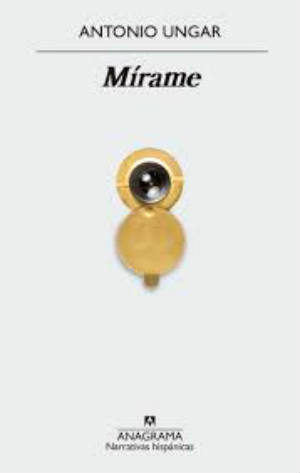Mírame. Antonio Ungar. Barcelona: Anagrama. 2018. 190 pages.
 A new family has come to live in the front, fifth floor apartment – it can be seen from the window with a pair of binoculars. They are “dark,” “Hindus or Arabs or Gypsies.” There are three men—one older and two younger—and a seventeen-year-old daughter with very long legs. Across the way, they don’t know it, but a man is watching them. Mostly, he is watching her. This is how Mírame [Look at me], Colombian author Antonio Ungar’s third novel, begins; it is all at once enveloping and disturbing.
A new family has come to live in the front, fifth floor apartment – it can be seen from the window with a pair of binoculars. They are “dark,” “Hindus or Arabs or Gypsies.” There are three men—one older and two younger—and a seventeen-year-old daughter with very long legs. Across the way, they don’t know it, but a man is watching them. Mostly, he is watching her. This is how Mírame [Look at me], Colombian author Antonio Ungar’s third novel, begins; it is all at once enveloping and disturbing.
That man that watches his neighbors keeps a diary, a brief series of entries where he writes what he sees and what he thinks—their goings and comings from the store, their stroll about the neighborhood, the decadence of the “old republic.” He takes notes of the lives of his immigrant neighbors, whatever these three Paraguayans do; he calls them savages. He is particularly focused on the movements of the daughter about the house, the clothing she wears, the food she cooks, the shape of her breasts. Even though he seems to be writing in the beginning for his dead sister (or so he says), he also writes as one would in an intimate, personal diary. It is like a confession, propping up his loneliness as though it were some sort of spiritual palliative for his state of anxiety and distress.
Through this diary (which forms the novel), the reader perceives the physical and mental journey of a profoundly disturbed man, xenophobic and racist to the bone, obsessive, neurotic, self-medicated and full of hatred towards the other; he hates the Indians, the Pakistanis, and the Romanians with equal fervor. He is sure that the Paraguayans are plotting something and above all, is obsessed with the daughter, for whom he rapidly begins to feel an unbalanced attraction. In an anxiety attack mixed with Clonazepam, Diazepam, Colpromazine, or Sertax, he manages to slip into their apartment and fill it with video cameras. From then on, he spies from his computer at all hours, consumed by the fever of obsession. Eventually, his body and his mind become a battle field when he ultimately begins a romantic relationship with Irina, the daughter of the “savages” and the object of his scorn, desire, and adoration.
Throughout all of this there is obviously a center-stage look at serious contemporary issues: immigration, racism, disdain for the other, the migrant’s situation, the alarming growth of the radical right and old nationalisms. To represent it and shed a light over it all, Ungar has chosen an original form—a brave narrative choice—by writing from the point of view of the aggressor, constructing his novel from the eyes of a racist.
Therein lies one of the novel’s great merits: the construction of a character who is by all accounts despicable, but for whom the reader cannot help but feel something akin to empathy. He is tinged, detestable without doubt, but human. Even though his pathetic outlook and the sickly contempt he feels for everything that isn’t like him awaken the immediate rejection of the reader, the intimate portrait of his daily life allow the narrator to reach moments of tenderness. He presents himself sensibly, almost tender, almost paternal, showing his pain, his fears, and all of his vulnerability. More than a great character, there is the great construction of a character. Where it would have been easy to sink xenophobia away into the mud of infamy, purging it from humanity, Ungar advances toward the exploration of a dreadful psyche, through a complex narrator that accumulates layers of sense, page after page. What goes or could go through the head of one of these newly blossoming racists all around the word? This novel tries to approach that problem.
With a distinct style from his earlier novels, with sober prose, contained tone, and deliberate sentences, Mírame conserves two of the best, characteristic flourishes of Ungar’s narrative. On one hand, he has a capacity to create tragic obsessions where humor still shows its face, because in good literature, there is no tragedy without comedy. On the other, he dominates the genre marked by suspense, velocity, and tension: the thriller. This work is developed around the confluence of subplots and the imminence of a series of violent acts.
After eight years without publishing—his last novel, Tres ataúdes blancos [Three white coffins] (Anagrama, 2010), was a finalist form the Rómulo Gallegos Prize—Colombian author Antonio Ungar has returned with this absorbing, disturbing novel. Now that half the world is screaming for walls and armed men on the borders to stop the unstoppable, a novel such as this should not—nay, cannot—go by unperceived.
Rodrigo Mariño López
University of Cincinnati
Translated by Michael Redzich





